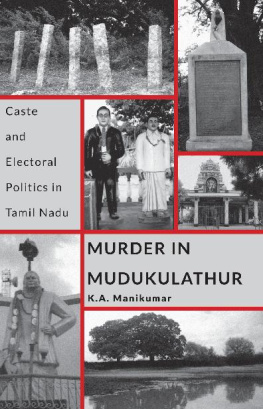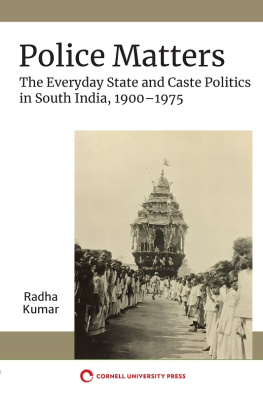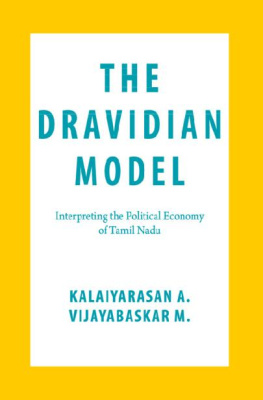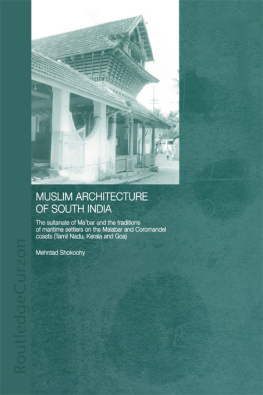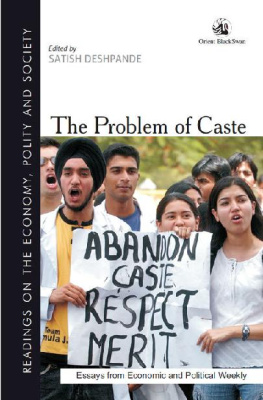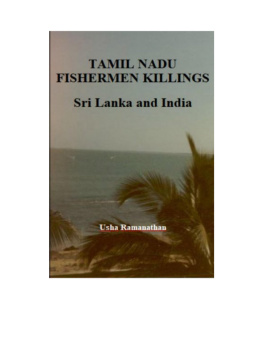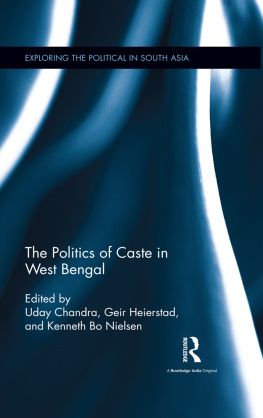The Mudukulathur Riots stand as a metaphor for caste relations in contemporary Tamil Nadu, by throwing into sharp relief the contradictions between dominant castes and Dalits. Through a dramatic reconstruction of the riots, Manikumar illuminates the dynamics of caste and politics. A must read for anyone interested in the social and political present of Tamil Nadu.
A.R. VENKATACHALAPATHY
author of In Those Days There Was No Coffee
Prof. K.A. Manikumars case study of the Mudukulathur riots of 1957 points the way to younger scholars, who wish to examine social conflicts in India with an eye to the liberation of oppressed peoples. He has collected and examined an amazing array of documents to tell this historical story of a remote part of the country. It is a classic example of the persistence of oppressed people in their struggle for justice.
S. KRISHNASWAMY
Professor (retired)
Madras Christian College, Tambaram
Print edition first published in May 2017
E-book published in August 2017
LeftWord Books
2254/2A, Shadi Khampur
New Ranjit Nagar
New Delhi 110008
INDIA
LeftWord Books is a division of
Naya Rasta Publishers Pvt. Ltd.
leftword.com
K. A. Manikumar, 2017
Cover photos by P. Sankar
TOP TO BOTTOM, LEFT TO RIGHT:
Five memorial stones erected in place of police firing, Keelathooval.
Tombstone of five Thevars killed in police firing, Keelathooval.
Statue of Dr. Ambedkar and Immanuel Sekaran, Kannuseri.
Temple raised over the grave of Muthuramalinga Thevar.
Muthuramalinga Thevars Statue, Mudukulathur.
Pond where five Thevar were shot, Keelathooval.
Terrible caste violence broke out in 1957 in eastern Ramanathapuram district (Tamil Nadu). The reasons for the outbreak were complex but the immediate trigger was this.
Muthuramalinga Thevar resigned from the Tamil Nadu Assembly, and a by-election was held on 1 July. In the bitterly contested election his Forward Bloc party members and Congress party members clashed. The violence spread across the district, causing many murders and the burning of homes. On 10 September 1957, the district collector C. V. R. Panikkar convened a peace conference in a bid to enforce peace.
At the conference, Muthuramalinga Thevar objected to the presence of Immanuel Sekaran, the leader of the Pallar community a Dalit community of Tamil Nadu. Sekaran, Thevar said, did not represent the Pallars. A. Perumal, the Pallar MLA who represented the Mudukulathur reserve constituency was the sole representative of the Pallar community. Thevar rebuked his followers for allowing Immanuel to grow in stature and talk back to him. The following day, Immanuel was found murdered near the railway station of Paramakudi. A police party led by Inspector Rai went to Keelathooval to arrest the accused, Angusamy Thevar and Peyan Muniyandi Thevar. The police shot five Thevars as they attempted to arrest these two men. This police shooting triggered the violence that followed in Ramanathapuram district.
The Thevar offensive against Pallars spread across the region, resulting in death and destruction. The police did not stay their guns. The press reported five incidents of additional police firing. Muthuramalinga Thevar was soon arrested under the Preventive Detention Act (1950). A few feeble protests followed, but the arrest led to the end of the Thevar offensive in the region. By the second week of October 1957, the violence had abated. Protests of a sporadic kind took place against the polices behaviour.
The government appointed a commission headed by a venerable civil servant, S. Venkateswaran who looked carefully into the police firing in Keelathooval. The report justified the police firing, saying that villagers in the area had attacked the police with deadly weapons. The opposition rejected the findings of the Commission contending that the police had arrested five leaders of the village, tied their hands and executed them. The opposition demanded a judicial enquiry, not only into the Keelathooval murders, but also the incidents of police firing in east Ramanathapuram. The Congress government, led by K. Kamaraj, rejected the oppositions demands. The opposition moved a no-confidence motion against Kamarajs ministry.
Etched in popular memory as the Mudukulathur Riots, the memories of this infamous event remain alive today. It is an event invoked both by Thevars and Pallars. While the Thevars remember it for the state violence, the Pallars recollect it as one more instance of caste violence, but where they resisted the violence bravely. Both communities have subsequently used the memory of Mudukulathur, the epicentre of riots in 1957, to mobilise their communities. The memory of Mudukulathur has also affected the subsequent political process of Tamil Nadu. This is not merely a historical episode. It is alive and well in Tamil Nadu.
The conflict of 1957 evokes longer histories of caste conflict in east Ramanathapuram. Here the main fault line is between the Mukkulathor (those of the three castes Maravar, Kallar and Agamudaiyar) and the Pallars (a Dalit community). The sharp antagonism is related not only to social discrimination, but is also rooted in the economic realities of property ownership. Until the turn of the twentieth century, the Mukkulathor were a law unto themselves. The government was virtually non-existent in the region. Local officials claimed not to be able to enforce the law, as they said they feared physical assault. When the colonial state invoked the Criminal Tribes Act 1871 against the Mukkulathor, it had no impact. As the dominant caste in east Ramanathapuram, their writ ran through the area. As with other dominant castes, the Mukkulathor subjected the Dalits especially the Pallars to several oppressive restrictions that forced many of them to emigrate or convert to Christianity in protest. Migration and conversion later enabled the Pallars to access education and acquire a heightened level of consciousness about their rights.
In the 1930s, there was an unprecedented upsurge among the Dalits in the east Ramanathapuram district in resisting dominant caste oppression. Yet it was not consolidated into an organised movement. By the early 1950s, because of a rise in the number of educated Dalit youth, and the leadership provided first by Perumal Peter and later by Immanuel Sekaran, the Pallars rallied under the banner of the Depressed Class Youth League and identified themselves politically with the ruling Congress party to participate as subjects in the development of their country. However, as Congress supporters, they found themselves pitted against U. Muthuramalinga Thevar and his political outfit, the All-India Forward Bloc that comprised mainly of Thevars.
Thevar is an honorific name common for Mukkulathor communities. Maravars inhabited in eastern Ramanathapuram district in large numbers. A government report from 1957 describes the Maravars or Thevars as
poorly educated. They are not able to reconcile to the present democratic conditions and cannot believe that the feudal system is vanishing fast[...]. The intimidation of Maravars and their leaders had resulted in a situation wherein land revenue could not be collected [...] and [the] absconding accused not arrested. [...] The police, revenue and other authorities have kept away from them due to cowardice. Police work had been carried through panchayatdars [...]. The Maravars in this area [the east Ramanathapuram region] had become law unto themselves.


